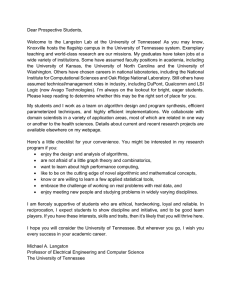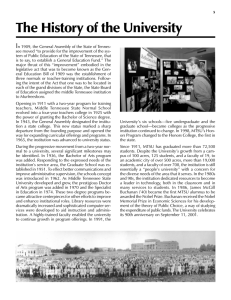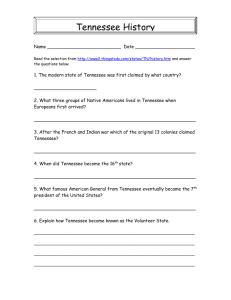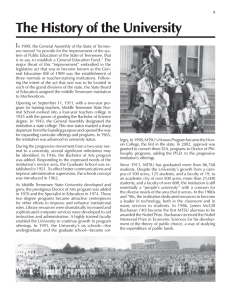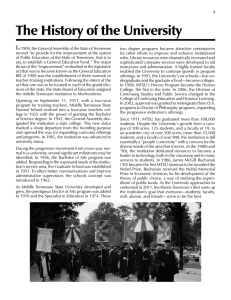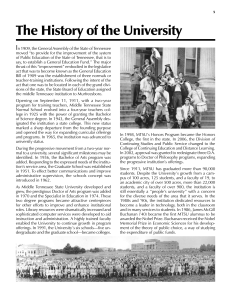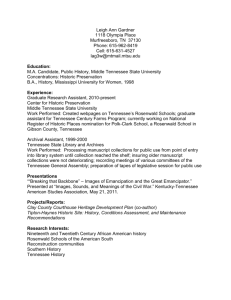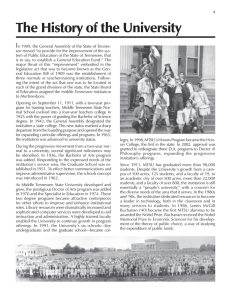Statement of Mission M
advertisement
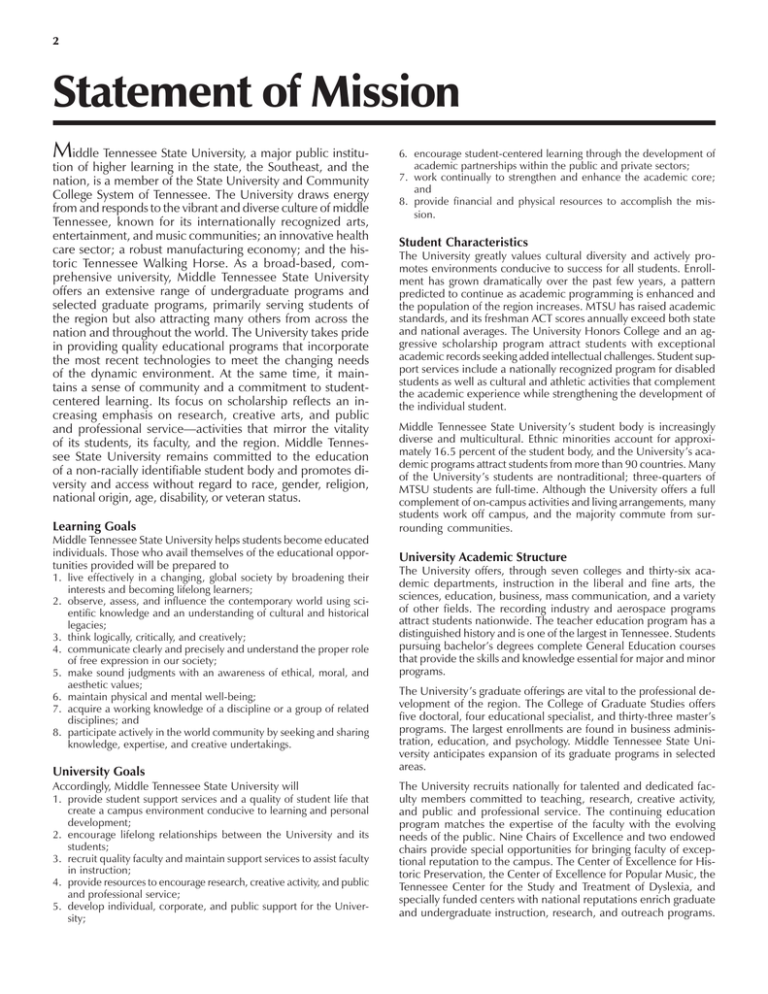
2 Statement of Mission Middle Tennessee State University, a major public institu- tion of higher learning in the state, the Southeast, and the nation, is a member of the State University and Community College System of Tennessee. The University draws energy from and responds to the vibrant and diverse culture of middle Tennessee, known for its internationally recognized arts, entertainment, and music communities; an innovative health care sector; a robust manufacturing economy; and the historic Tennessee Walking Horse. As a broad-based, comprehensive university, Middle Tennessee State University offers an extensive range of undergraduate programs and selected graduate programs, primarily serving students of the region but also attracting many others from across the nation and throughout the world. The University takes pride in providing quality educational programs that incorporate the most recent technologies to meet the changing needs of the dynamic environment. At the same time, it maintains a sense of community and a commitment to studentcentered learning. Its focus on scholarship reflects an increasing emphasis on research, creative arts, and public and professional service—activities that mirror the vitality of its students, its faculty, and the region. Middle Tennessee State University remains committed to the education of a non-racially identifiable student body and promotes diversity and access without regard to race, gender, religion, national origin, age, disability, or veteran status. Learning Goals Middle Tennessee State University helps students become educated individuals. Those who avail themselves of the educational opportunities provided will be prepared to 1. live effectively in a changing, global society by broadening their interests and becoming lifelong learners; 2. observe, assess, and influence the contemporary world using scientific knowledge and an understanding of cultural and historical legacies; 3. think logically, critically, and creatively; 4. communicate clearly and precisely and understand the proper role of free expression in our society; 5. make sound judgments with an awareness of ethical, moral, and aesthetic values; 6. maintain physical and mental well-being; 7. acquire a working knowledge of a discipline or a group of related disciplines; and 8. participate actively in the world community by seeking and sharing knowledge, expertise, and creative undertakings. University Goals Accordingly, Middle Tennessee State University will 1. provide student support services and a quality of student life that create a campus environment conducive to learning and personal development; 2. encourage lifelong relationships between the University and its students; 3. recruit quality faculty and maintain support services to assist faculty in instruction; 4. provide resources to encourage research, creative activity, and public and professional service; 5. develop individual, corporate, and public support for the University; 6. encourage student-centered learning through the development of academic partnerships within the public and private sectors; 7. work continually to strengthen and enhance the academic core; and 8. provide financial and physical resources to accomplish the mission. Student Characteristics The University greatly values cultural diversity and actively promotes environments conducive to success for all students. Enrollment has grown dramatically over the past few years, a pattern predicted to continue as academic programming is enhanced and the population of the region increases. MTSU has raised academic standards, and its freshman ACT scores annually exceed both state and national averages. The University Honors College and an aggressive scholarship program attract students with exceptional academic records seeking added intellectual challenges. Student support services include a nationally recognized program for disabled students as well as cultural and athletic activities that complement the academic experience while strengthening the development of the individual student. Middle Tennessee State University’s student body is increasingly diverse and multicultural. Ethnic minorities account for approximately 16.5 percent of the student body, and the University’s academic programs attract students from more than 90 countries. Many of the University’s students are nontraditional; three-quarters of MTSU students are full-time. Although the University offers a full complement of on-campus activities and living arrangements, many students work off campus, and the majority commute from surrounding communities. University Academic Structure The University offers, through seven colleges and thirty-six academic departments, instruction in the liberal and fine arts, the sciences, education, business, mass communication, and a variety of other fields. The recording industry and aerospace programs attract students nationwide. The teacher education program has a distinguished history and is one of the largest in Tennessee. Students pursuing bachelor’s degrees complete General Education courses that provide the skills and knowledge essential for major and minor programs. The University’s graduate offerings are vital to the professional development of the region. The College of Graduate Studies offers five doctoral, four educational specialist, and thirty-three master’s programs. The largest enrollments are found in business administration, education, and psychology. Middle Tennessee State University anticipates expansion of its graduate programs in selected areas. The University recruits nationally for talented and dedicated faculty members committed to teaching, research, creative activity, and public and professional service. The continuing education program matches the expertise of the faculty with the evolving needs of the public. Nine Chairs of Excellence and two endowed chairs provide special opportunities for bringing faculty of exceptional reputation to the campus. The Center of Excellence for Historic Preservation, the Center of Excellence for Popular Music, the Tennessee Center for the Study and Treatment of Dyslexia, and specially funded centers with national reputations enrich graduate and undergraduate instruction, research, and outreach programs.
